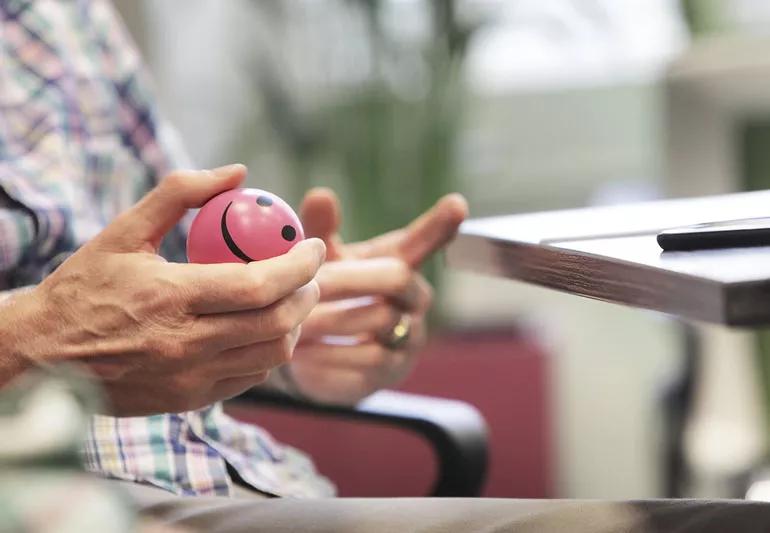Tips to squash this sneaky habit

Image content: This image is available to view online.
View image online (https://assets.clevelandclinic.org/transform/2acb6b68-2a61-41bd-a558-d2f25dca57d1/noHandsFaceCovid-1018792200-770x533-1_jpg)
man keeping his hands busy using a stress ball
If you’ve been heeding the advice of health officials lately, you’ve probably been washing your hands a lot, keeping your distance from others and crafting a homemade face cover to wear if you need to go out.
Advertisement
Cleveland Clinic is a non-profit academic medical center. Advertising on our site helps support our mission. We do not endorse non-Cleveland Clinic products or services. Policy
You’ve probably also become woefully aware of just how often you rub your eyes, itch your nose or bite your nails.
Health experts recommend that you avoid touching your face because it can potentially protect you from infection. While the coronavirus that causes COVID-19 is believed to be spread mostly by inhaling droplets released when an infected individual coughs or sneezes, these droplets can also land on surfaces. If you touch an infected surface with your hand and then touch your eyes, nose or mouth — which are also entryways for viruses into your body — you could potentially become infected and get sick.
But not touching your face is easier said than done. Here’s some advice on breaking the habit.
Hand-face contact happens often throughout the day — most of the time without us even realizing it. One study of medical students found that participants touched their faces some 23 times an hour, and nearly half of those instances involved their eyes, nose or mouth.
“Most likely it’s an unconscious or even nervous behavior, like twirling your hair,” says behavioral health clinical therapist Karen Tucker, LISW-S, ACSW.
So the first step to keeping your hands away from your face is simply becoming aware of when and how you do it. You might try to:
Advertisement
Once you become aware of your face-touching habits, changing them can take time and patience.
Here are some hands-off strategies to try.
Advertisement

Sign up for our Health Essentials emails for expert guidance on nutrition, fitness, sleep, skin care and more.
Learn more about our editorial process.
Advertisement
Symptoms can overlap and be hard to distinguish, but there are some telltale differences
The flu, RSV, COVID-19, pneumonia and more typically circulate during cold weather months
The advice dates to 1574, but it doesn’t quite meet modern medical guidelines
Ultimately, the best medicine for a cold is time, fluids and rest
From garlic to elderberry, here’s how not to get rid of a cold
Colder temps bring flu worries, fall allergies, dry skin and more
You can’t cure it, but you can manage the symptoms
Here’s one TikTok trend you shouldn’t try
Type 2 diabetes isn’t inevitable with these dietary changes
Applying a hot or cold compress can help with pain
Pump up your iron intake with foods like tuna, tofu and turkey